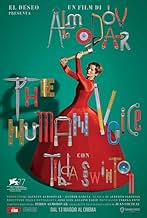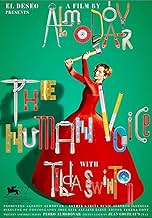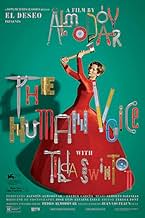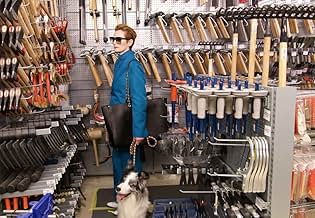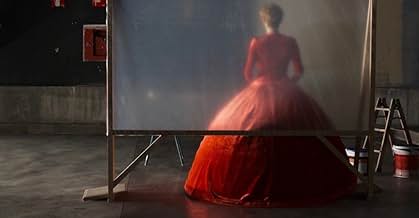IMDb RATING
6.8/10
9.7K
YOUR RATING
A woman watches time passing next to the suitcases of her ex-lover (who is supposed to come pick them up, but never arrives) and a restless dog who doesn't understand that his master has aba... Read allA woman watches time passing next to the suitcases of her ex-lover (who is supposed to come pick them up, but never arrives) and a restless dog who doesn't understand that his master has abandoned him. Two living beings facing abandonment.A woman watches time passing next to the suitcases of her ex-lover (who is supposed to come pick them up, but never arrives) and a restless dog who doesn't understand that his master has abandoned him. Two living beings facing abandonment.
- Director
- Writers
- Stars
- Director
- Writers
- All cast & crew
- Production, box office & more at IMDbPro
Featured reviews
While Swintons performance is a great showcase for her range and understanding of this character - The Human Voice can feel a bit to self indulgent and overly sarcastic. Almodovars direction shines in the moments where Swinton dominates the screen but falters when trying to build a world around her that would support the feeling of the emotional turmoil she is in.
One thing I noticed, and adored, about Almodóvar, is that despite his unequivocal propensity for incorporating comedy with melodrama, there's no way his films could come across as either silly or overly sentimental. For his stories are laced with considerable nuance. His Women on the Verge on a Nervous Breakdown, which is also based on Jean Cocteau's play, "La voix humaine" as this short is, maintains an incremental humorous tone so much so it could be adequately described, by its end, as a farce. Yet, as we see Pepa trying to figure out why her lover dumped her without an explanation, Almodóvar delves into Pepa's psyche with great subtlety that's apt for her precarious state. That's why I thought The Human Voice would benefit greatly from the concentrated nature of short films. Our unnamed protagonist's wait for three days for her lover to come in a last chance to see him has filled her with rage. A vindictive rage almost identical to that of The Bride in Kill Bill, but she still loves him. So she acts out like a maniac: stabbing one of her lover's suits with an axe in a harmless cathartic release. She wouldn't dare to actually hurt him; she still loves him. Therefore, she's so vulnerable. Over the course of her conversation with his lover, her seemingly stable and wry demeanour gradually crumbles, exposing both her helplessness and her futile undirected rage. Almodóvar brilliantly highlights such contradiction and lays her feelings bare by showing the soundstage her exuberantly furnished, sumptuously coloured apartment is constructed upon. As she grows more desperate, she begins to lose control. Finally, she decides to free herself from the submissive woman she's always been, and put an end to their toxic relationship - after all, her love made her too fragile and delicate to venture to turn the tables on him as Alma did on Reynolds in Phantom Thread. The thing is, I didn't feel that she loves him. What's baffling is that I can't put my finger on why exactly I feel so, but it's likely due to the stagy feel this film has. It is a showcase of Tilda Swinton's thespian prowess, but, at times, her monologue comes off rather like a soliloquy - like there's no one on the other side of the phone line. Regardless, The Human Voice is an eye-popping, exquisitely-made feminist work with witty sarcastic undertones.
Jean Cocteau's play La Voix Humaine (The Human Voice) opened at the Comédie Française in 1930 as a atar vehicle for Belgian actress Berthe Bovy, then popular in Parisian stages. The work involves a woman, only identified as Elle = She, speaking on the telephone with his lover of several years, who is leaving her.for another woman. Her interlocutor is silent for the duration and we don't even know for sure if he is listening or if the connection has been broken.
The play had an enduring popularity, and has been since in the repertory of many theater companies. It was put on screen several times, among them by Roberto Rossellini (first episode of L'Amore 1946: actress Anna Magnani) and by Ted Kotcheff (1966: actress Ingrid Bergman). It even had a second life as an opera by Francis Poulenc in 1958, which has been as well accepted as the play and is still being staged and recorded.
This being the Almodóvar version, we may expect some off the wall happenings. One is a very funny scene where the protagonist browses for axes in a hardware store that seems to have an unusually large inventory of the item. On another, the axe in question is used in a hilarious way. We are shown mid-movie that She's apartment is actually a set in a sound stage which is perhaps a gentle dig at he artificiality of the play. And, last but not least, we have the director's trademark, cinematography in gloriously saturated colors. Tilda Swinton does an outstanding job as She; she tones down the melodrama and borders on the humorous at times. All in all, a refreshing take on the play and the best version I have seen.
The play had an enduring popularity, and has been since in the repertory of many theater companies. It was put on screen several times, among them by Roberto Rossellini (first episode of L'Amore 1946: actress Anna Magnani) and by Ted Kotcheff (1966: actress Ingrid Bergman). It even had a second life as an opera by Francis Poulenc in 1958, which has been as well accepted as the play and is still being staged and recorded.
This being the Almodóvar version, we may expect some off the wall happenings. One is a very funny scene where the protagonist browses for axes in a hardware store that seems to have an unusually large inventory of the item. On another, the axe in question is used in a hilarious way. We are shown mid-movie that She's apartment is actually a set in a sound stage which is perhaps a gentle dig at he artificiality of the play. And, last but not least, we have the director's trademark, cinematography in gloriously saturated colors. Tilda Swinton does an outstanding job as She; she tones down the melodrama and borders on the humorous at times. All in all, a refreshing take on the play and the best version I have seen.
This has quite a lot to live up to. The 1966 version with Bergman is a masterpiece. Plus this is directed by Pedro Almodóvar AND it's his first English language film. I've been itching to see this for a long time. Delayed like many films due to the pandemic, my expectations have been heightened. Always dangerous going into a film. This was interestingly shot during lockdown, behind the scenes shots showing the crew in masks. I suppose this might be the perfect film project for social distancing. In place of Bergman is Tilda Swinton. She's not in the same intimate setting as her predecessor. In fact she's a lot more freedom, starting browsing axes in a hardware store. The premise is the same though. An unnamed woman, alone after being left by her lover. Only a dog for company. Even here though, things are dialled up, the dog can act! Also pining for the now missing man, seriously the dog is great! What's also great is her apartment. It's gorgeous! Modern clean lines, bold colours. It screams taste and control. Inexplicably though, it's not shown to be a real apartment. It's a set, built in a warehouse-like sound stage. I've not yet decided why, other than it looks wonderful as we see aerial shots, Swinton moving from room to roofless room smashing things in anger and frustration. We're a third way in before the phone rings. This time an iPhone with AirPods. Here we get closer to Bergman's portrayal. The monologue taking centre stage as Swinton wanders in and out of hers. It's a much more stylised interpretation and feels a little soulless in places for it, but it still works. The relationship described is much more modern, less traditional, less conservative, but the emotions are just as raw and Swinton delivers with just as effective might. Is it better than the 1966 version? No, but I think it might be as good, or very very close. I might need to watch it a few times to appreciate it fully. Swinton though is undoubtably brilliant and Almodóvar has updated the premise with all the invention you'd expect. It might even have a better ending. My expectations were high and I wasn't disappointed.
Pedro Almodovar's short is, as the credits state - "freely adapted" from a Jean Cocteau stage production. Almodovar retains the central conceit of the play as it essentially is a monologue with a woman on a telephone talking with a lover (the other voice is never heard). Almodovar includes a brief prologue and he winks at the viewer by 'revealing' the artificiality of his own production. He also revels in his usual saturated color schemes.
Fortunately, the woman is played by Tilda Swinton who has to carry the full half hour alone. Almodovar wisely has shaped the material (for the first time in English) around Swinton's talents and she carries it off for the most part, even if some of the eccentricities the Writer-Director don't really work.
Fortunately, the woman is played by Tilda Swinton who has to carry the full half hour alone. Almodovar wisely has shaped the material (for the first time in English) around Swinton's talents and she carries it off for the most part, even if some of the eccentricities the Writer-Director don't really work.
Did you know
- TriviaThis is Pedro Almodóvar's first film in English.
- ConnectionsFeatured in Projector @ LFF: One Night in Miami/The Human Voice (2020)
Details
- Release date
- Country of origin
- Languages
- Also known as
- The Human Voice
- Filming locations
- Production company
- See more company credits at IMDbPro
Box office
- Gross worldwide
- $164,623
- Runtime30 minutes
- Color
- Sound mix
- Aspect ratio
- 1.85 : 1
Contribute to this page
Suggest an edit or add missing content


![Watch Tráiler [OV]](https://m.media-amazon.com/images/M/MV5BYzQyNTRjNDMtMDU3MS00M2M2LWIwMDQtYThjNTllZmE2ZWQ2XkEyXkFqcGdeQXRyYW5zY29kZS13b3JrZmxvdw@@._V1_QL75_UX500_CR0)


